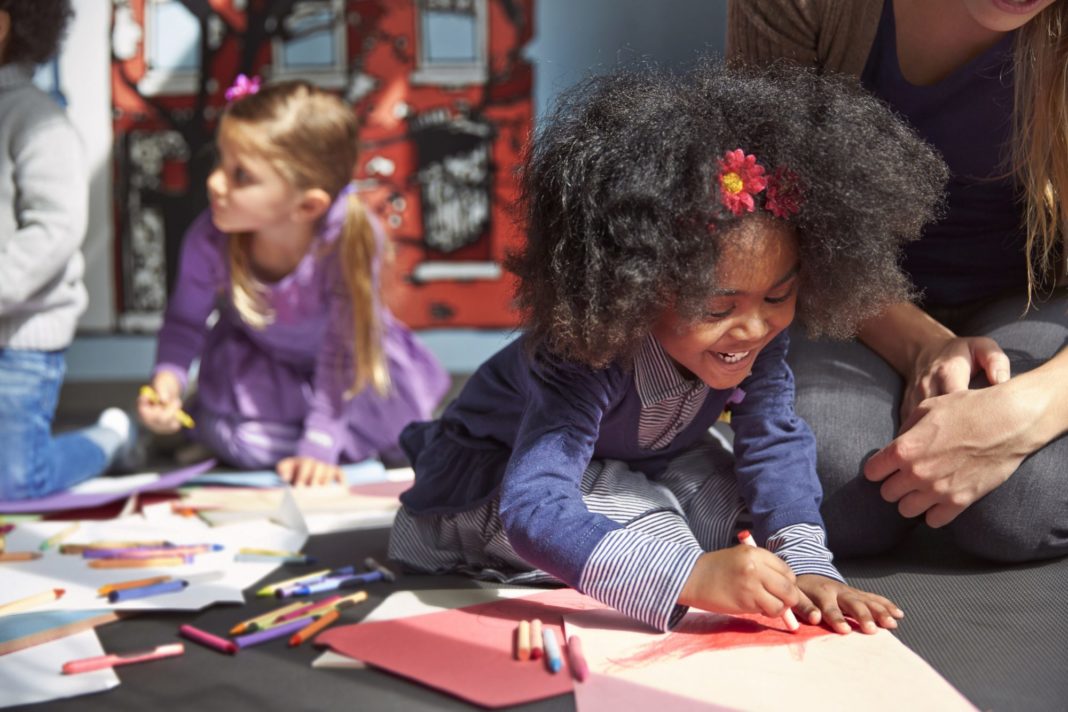This fall, more so than others, parents may be anxious about whether their children are ready for kindergarten. The COVID-19 pandemic upended school routines across the world, and parents across the country delayed enrolling their children in kindergarten, according to education outlet The 74. The result is a large class of incoming kindergartners who have had an exceptionally wide range of experiences over the past year. But most parents don't need to worry.
While you can find myriad lists of "what kids should know before kindergarten," the reality is much simpler. Most typically developing children will have mastered the skills they need for kindergarten readiness, and most of those who haven't will do so with some help from parents and teachers. The small subset of kids who still struggle with the requirements of kindergarten can be aided by formal special education evaluations and assistance.

Think ‘Readiness’ Instead of ‘Requirements’
There isn't one definite list of "kindergarten requirements." In many places, kids who are age-eligible can't be prevented from attending kindergarten even if a school district's screening suggests they're not quite ready. The things kids should know before kindergarten track the typical developmental milestones for children their age. You can see the full list from the Centers for Disease Control and Prevention, but by age 5, most kids can do things such as:
Broadly speaking, kindergarten readiness breaks down into areas like separating from parents, socialization with other kids, and communication. Kindergartners need to be able to express their wants and needs to their teachers, manage their own clothing in the bathroom, and follow simple directions. Children who have been in preschool or pre-K will have likely practiced these skills. Unless your child's teacher has raised an issue, parents and caregivers shouldn't worry that a child isn't ready for kindergarten.
While having some exposure to these pre-academic skills is helpful as kids transition to kindergarten, it's not a hard requirement and teachers are used to kids arriving with a wide range of experience.
"One of the reasons I love teaching kindergarten is because it is sort of like everyone enters with a blank slate," says Mollie Bruhn, an early childhood educator in New York City. The wake of COVID-19 pandemic is in many ways a bigger version of a normal year, where kids enter kindergarten after a variety of early childhood experiences, and teachers meet them where they're at.
"I think the last thing we need to do is put more pressure on families or kids," she says.
School districts generally screen rising kindergartners for academic and developmental readiness in the spring or summer. If there are things a child needs to work on, parents can practice with them before school starts, says Jamie Broach, MA, CCC-SLP, the preschool and school-age speech-language pathologist for a public school district in southeast Ohio.
In terms of communication, Broach says she'd expect a child starting kindergarten to be able to be understood by an adult who doesn't know them well and to be able to follow directions with two steps. For instance, "get a pencil and put it on the desk."
Children who haven't been in center-based care may have had fewer opportunities to practice some skills, such as being around other kids or following a routine. For these kids, Broach said, some structured activities—like storytime at the library or swim lessons—can be beneficial. She also encouraged all parents to read to their children.
Parents don't need to prepare their kids for a kindergarten evaluation, Broach says, beyond telling them the procedural details. In addition to advising individual families on their children, school districts use the results of the evaluations to plan out their classes and understand what support students might need, she said.
When Children Should Start Kindergarten
In 19 states and the District of Columbia, kindergarten is the first year of required formal schooling. In a some states, all students must enroll in kindergarten the year they turn 5 years old. However, in other states, like Ohio, kindergarten is mandatory but school enrollment isn't required until age 6. This means parents have discretion over when exactly to enroll their children. They may enroll a child in kindergarten once they turn five, but must enroll them in school once they're six.
Some parents may delay kindergarten enrollment for kids they don't believe are ready for school yet, a practice known colloquially as "redshirting." This tends to be more common for children of affluent, highly educated parents—they retain a child who would be among the youngest in their grade. Research isn't clear that delaying entry to kindergarten in these cases is beneficial, and doing it requires families to pay for another year of private childcare.
The COVID-19 pandemic has complicated kindergarten enrollment: Many parents delayed enrolling their children in kindergarten in the 2020-2021 school year out of concerns about safety or a desire to avoid remote learning.
A recent report by NWEA, an educational research advocacy organization, outlined the challenges schools will face this fall in teaching both kindergarten and first grade. Many rising first graders will have missed out on the skills usually developed during in-person kindergarten and the class overall will be smaller because of a nationwide drop in kindergarten enrollment. Correspondingly, the kindergarten class this fall will be larger as families come back to school. The students, however, will have had wildly disparate learning experiences under the pandemic, which will have affected their kindergarten readiness. Schools will need to adjust to this wider range.
"My perception of what the challenges are going to be," said Bruhn, lies in "bringing all these people who've been in so many different situations back together."
Bruhn said that parents and caregivers of rising kindergartners should communicate with their child's teacher about what their learning experience has been like over the past year.
"Tell them how the previous year was. Tell them what they learned or didn't learn in Pre-K," she says. "The more information that teachers have the better they'll be able to meet the needs of the kids."
Both experts emphasize that parents shouldn't stress over prepping their children for kindergarten. "Reading books, playing with your kids, those kinds of things" are enough, Broach says.
Bruhn concurred, suggesting safely socializing with other kids, and doing some activities as a family. "Everyone needs a sigh of relief, this summer, and have faith that teachers are used to meeting kids where they're at. That is our job. That's what we do."
































